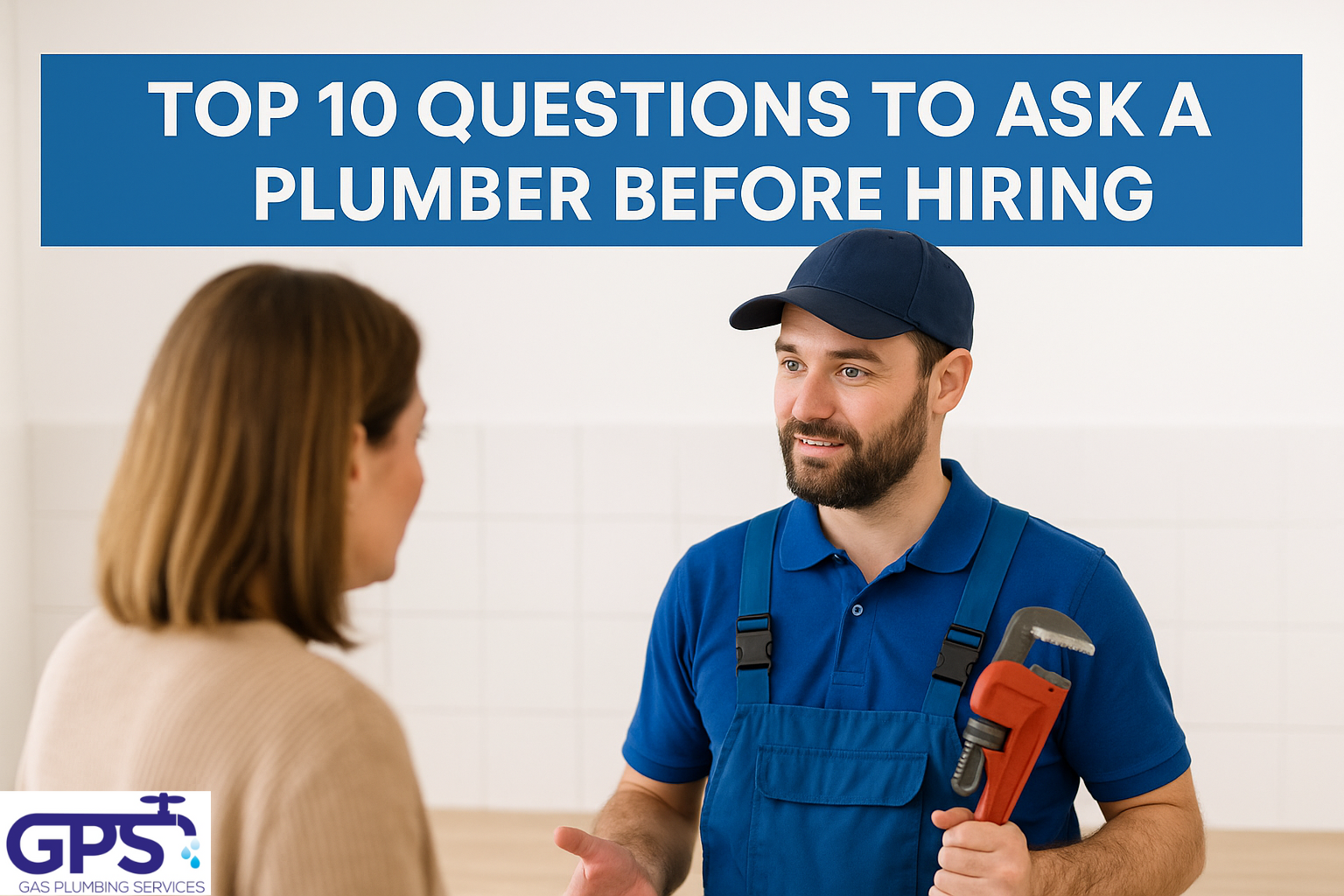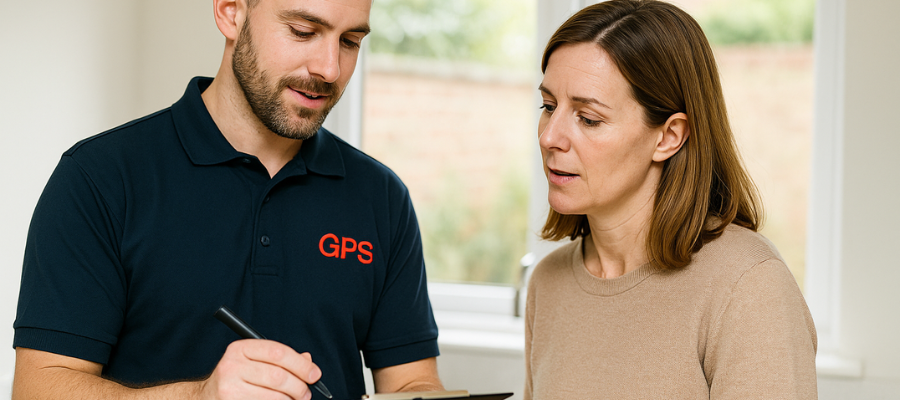Top 10 Questions to Ask Before Hiring a Plumber in Sydney
Hiring a plumber might seem straightforward, but choosing the wrong one can lead to unexpected costs, poor workmanship, and even long-term damage to your property. Whether you’re dealing with a leaky tap or a burst pipe, finding the right professional can save you time, money, and stress.
In cities like Sydney, where homes often vary from heritage builds to modern apartments, it’s especially important to work with a qualified and experienced plumber who understands local plumbing systems and regulations. But how do you know if a plumber is the right fit?
This guide covers the top 10 essential questions every homeowner should ask before hiring a plumber. Armed with this checklist, you’ll be in a much better position to choose someone reliable, transparent, and capable of delivering high-quality work.

1. Are You a Licensed and Insured Plumber?
This should be the very first question you ask any plumber. Licensing ensures that the plumber has met the minimum requirements for education, training, and legal compliance to perform plumbing work in your area. In Sydney, a licensed plumber must adhere to strict codes and standards, which help protect homeowners from poor-quality workmanship and unsafe practices.
Insurance is just as crucial. It shields you from liability if something goes wrong on the job, like accidental property damage or injuries to workers. Always request to see proof of both a valid plumbing license and public liability insurance.
If you’re searching for a reliable and fully accredited plumber Sydney, make sure they can show these credentials upfront. It’s your first line of defense against subpar service.
2. What Experience Do You Have With My Type of Plumbing Issue?
Not all plumbers handle every type of plumbing job. Some specialise in blocked drains, others in gas fitting, and some focus on hot water systems or renovations. Before you commit, it’s essential to ask whether they’ve dealt with your specific issue before—and how often.
An experienced plumber will be able to quickly assess the situation, explain the root cause, and recommend the most efficient fix. Their background can also influence the tools and techniques they use, which could save you both time and money.
For example, if you’re experiencing recurring pipe blockages, someone familiar with CCTV drain inspections and hydro jetting will likely offer a more lasting solution than a generalist without that expertise.
The more relevant the experience, the more confidently you can expect a safe, effective, and timely resolution.
3. Can You Provide References or Customer Reviews?
A trustworthy plumber should have no problem sharing reviews or references from past clients. These testimonials provide real insight into their reliability, quality of work, communication, and overall customer service.
Ask for references or check online platforms like Google Reviews, TrueLocal, or ServiceTasker. Pay attention to how recent the reviews are, how the plumber responds to feedback, and whether customers mention repeat business—this often signals a job well done.
If a plumber is hesitant or unable to provide references, consider it a red flag. A solid track record is one of the best indicators that you’re hiring someone who values professionalism and takes pride in their work.
4. Do You Offer Upfront Pricing or Free Quotes?
Transparent pricing is one of the hallmarks of a reputable plumber. Before any work begins, you should know exactly what you’re paying for—no surprises, no hidden fees. Asking whether the plumber offers upfront pricing or free quotes can help you avoid bill shock once the job is done.
Many professional plumbers will visit your property, assess the issue, and provide a detailed quote at no charge. This shows confidence in their pricing and respect for your budget. Be cautious of anyone who is vague about costs or reluctant to provide a written estimate.
Also, clarify what’s included in the quote—labour, parts, GST, call-out fees—and whether additional costs may apply for unexpected complications.
A clear, itemised quote helps you compare providers and sets expectations from the start, giving you peace of mind throughout the job.
5. What Are Your Hourly Rates and Call-Out Fees?
Understanding how a plumber charges—whether it’s a flat rate, hourly fee, or a combination—is crucial to budgeting for your job. In Sydney, call-out fees can range anywhere from $50 to $150, depending on the plumber’s location and the urgency of the job. On top of that, hourly rates for labour can vary widely, often between $80 and $150 per hour.

Ask for a clear breakdown of:
- The base call-out fee
- The hourly rate (and minimum hours, if applicable)
- Rates for after-hours, weekends, or public holidays
Some plumbers may charge higher rates for emergency services, so knowing these upfront will help you avoid misunderstandings or sticker shock later.
Being informed about pricing structures also makes it easier to compare quotes from different providers and select the one offering the best value, not just the lowest price.
6. What Is Your Availability and Response Time for Emergencies?
Plumbing emergencies don’t wait for business hours. Whether it’s a burst pipe, overflowing toilet, or no hot water in the middle of winter, you need a plumber who can respond quickly, day or night.
Ask whether the plumber offers 24/7 emergency services and how fast they typically respond. A quick response can be the difference between a minor inconvenience and major water damage.
Also clarify:
- Are they available on weekends and public holidays?
- What is their average response time within your area?
- Do emergency rates differ from standard hours?
Even if you’re hiring for a non-urgent job, knowing their availability in a crisis is valuable. A dependable plumber with a solid emergency protocol is worth keeping on your contact list long after the initial job is done.
7. Do You Guarantee Your Work?
A professional plumber should stand behind their work with a clear guarantee or warranty. This shows confidence in the quality of their service and gives you added protection if something goes wrong after the job is complete.
Ask the plumber:
- Do you offer a written guarantee?
- How long does it last—30 days, 6 months, a year?
- Does it cover parts, labour, or both?
In Sydney, many reputable plumbers offer guarantees ranging from 3 months to 12 months, depending on the nature of the work. This assures you that if the issue reoccurs due to poor workmanship or faulty parts, they’ll return to fix it at no extra cost.
Avoid plumbers who refuse to guarantee their work. A lack of warranty may indicate a lack of accountability—or worse, substandard service.
8. Will You Be Doing the Work Yourself or Sending an Apprentice?
It’s important to know exactly who will be working on your property. The person you speak with during the quote process may not be the one doing the job. That’s why you should always ask: “Will you be completing the work yourself, or will it be done by someone else on your team?”
In many cases, a qualified plumber may supervise while an apprentice or junior tradesperson handles the physical work. That’s perfectly acceptable—provided there’s proper supervision and communication. However, you’ll want to confirm:
- The experience and qualifications of the person doing the job
- Whether the work will be checked and signed off by a licensed plumber
- Who to contact if issues arise during or after the job
This clarity helps avoid miscommunication and ensures you’re getting the professional service you’re paying for.
9. What Tools and Technology Do You Use?
Modern plumbing isn’t just about wrenches and pipes anymore. Today’s plumbers use advanced tools and technology to diagnose and fix problems more efficiently and with less disruption to your home.
Ask your plumber about the equipment they use, such as:
- CCTV drain cameras for inspecting pipes without unnecessary digging
- Hydro jetting machines to clear tough blockages effectively
- Pipe relining technology that repairs damaged pipes without full replacement
- Leak detection devices to pinpoint hidden leaks quickly
Plumbers who invest in the latest tools can often complete jobs faster, more safely, and with better long-term results. Plus, these technologies usually reduce mess and inconvenience during repairs.
10. Do You Clean Up After the Job Is Done?
A professional plumber not only delivers quality work but also respects your home by leaving the workspace clean and tidy. Plumbing jobs can be messy—there may be water spills, debris, or leftover materials.
Before hiring, ask if the plumber includes cleanup as part of their service. Clarify:
- Will they remove all waste and packaging?
- Do they clean up any mess caused by the work?
- Is tidying up included in the quoted price?
A plumber who cares about post-job cleanliness shows professionalism and respect. It saves you time and hassle and ensures your home looks just as good as it did before the work started.
Conclusion
Hiring the right plumber can make all the difference between a smooth repair and a costly headache. By asking these top 10 questions before you hire, you protect yourself from poor workmanship, unexpected charges, and delays.
Remember to verify licensing and insurance, check their experience and references, clarify pricing and availability, and confirm who will be doing the work. Don’t forget to inquire about guarantees, the technology they use, and their cleanup policies.
If you’re looking for a trusted plumber in Sydney who ticks all these boxes, take the time to do your research and ask these essential questions. Doing so will ensure you get professional, reliable service that keeps your home’s plumbing running smoothly for years to come.


